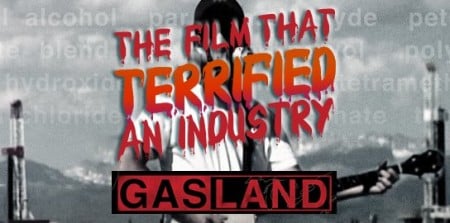And the Oscar For Best Horror Film Goes to…Gasland!

Photo courtesy of Josh Fox and latered by Jamie Leo.
View more images on our Flickr site
Maybe Gasland, Josh Fox’s film about fracking, should have been classified as a horror movie, because it appears to have the oil and gas industry running scared. Their lobby group, Energy in Depth, just sent a letter to the Academy of Motion Picture Arts and Sciences claiming that Gasland should be ineligible for an Oscar because of its “many errors, inconsistencies and outright falsehoods,” and calling it “an expression of stylized fiction.”
Fox’s movie had barely been released when that same group published Debunking Gasland, in which they point out all the so-called inaccuracies in the film. It’s worth noting that Fox actually devoted a fair amount of time in the film calling drilling companies to get information about their processes. No one would take his call. Fox provides a list of all companies he tried to contact at the end of the film. (Editor’s note: Ironically, almost the exact same thing happened with Food, Inc., nominated for Best Doc last year.)
A quick review of Debunking Gasland finds just as much exaggeration as the site claims to exist within Fox’s film. “As it relates to the composition of fluids commonly used in the fracturing process, greater than 99.5 percent of the mixture is comprised of water and sand. The remaining materials…are typically components found and used around the house. The most prominent of these, a substance known as guar gum, is an emulsifier more commonly found in ice cream.”
Guar gum? Really, Energy in Depth?
The industry hides behind a cloak of “proprietary business practices” to avoid explaining what’s really in that remaining 0.5 percent. In addition, companies work hard to evade responsibility for any degradation to human health and environment around their drilling sites. An example is recently confirmed cases of diesel fuel being pumped into boreholes by gas drillers like Halliburton. Hydraulic fracturing was exempted from the Safe Drinking Water Act with a promise and a handshake from the three major drillers not to use diesel fuel in the process. In this recent case Halliburton says it didn’t break any laws when it injected diesel fuel because, “There are currently no requirements in the federal environmental regulations that require a company to obtain a federal permit prior to undertaking a hydraulic fracturing project using diesel.”
Members of the industry even go so far as to claim that the practice causes no damage at all. Last month T. Boone Pickens went on The Daily Show with John Stewart to discuss his energy plan, which would have the United States utilizing its own energy resources in 10 years and which, of course, includes natural gas. In his interview, T. Boone said, “I have fracked 3000 wells in my life. I’ve never seen anything damaged.” Those wells were drilled by humans (who make mistakes) with mechanical equipment (that is subject to failure) and in nature (which is subject to surprise conditions). Besides, who knows where all those wells were drilled? If a well is drilled in the forest and no one is around…
T. Boone, I’m sorry, but I’m just not buyin’ what you’re sellin’.
Industry spokespeople express surprise and outrage that environmental and citizen groups want the practice of hydraulic fracturing to be fully investigated and regulated. Even government considers citizen meetings, where fracking is discussed in open and responsible forums, to represent some sort of terror risk. How is a real debate over this issue supposed to happen if both industry and government try to silence the discussion?
We get it. Natural gas drilling isn’t going to end any time soon. Even President Obama says “Winning the Future” through clean energy will include natural gas. In what may be facilitating our own ecological undoing, this country is nowhere near ready to let go of our love of cheap energy. Even still, the onus should be on the natural gas drilling industry to prove that drilling can be accomplished in a manner that is safe for both human health and the environment. As it stands now, fracking is exempt from the Safe Drinking Water Act by the “Halliburton Loophole,” which lets gas drilling companies off the hook and leaves them almost entirely unaccountable.
Clearly Fox’s film hit a nerve. Why spend so much energy trying to silence the film if there’s nothing wrong with fracking? Because the industry knows that documentary films can have a huge impact and this film, while not a huge box office success, has been a huge success at getting this critical conversation going. Why squelch that conversation?
The oil and gas drilling industry is rich with a history of shady business practices and environmental devastation. To deny that is absolute lunacy. Just ask the people of Ecuador and the Gulf Coast.
How about no longer hiding behind proprietary business practices and denying that problems have happened? How about engaging in the discussion and working with citizen groups? How about conducting business in a manner that is safe for people and the environment and completely transparent? Otherwise, don’t be horrified when films like Gasland get made and individuals, towns and whole states balk at the bad checks being written against the industry’s huge profits.

